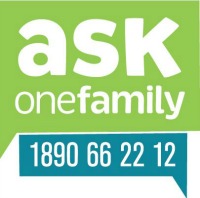 askonefamily is a helpline offering information and listening support for men and women who may be parenting alone, sharing parenting or separating. The helpline is also available to extended family, friends or professionals.
askonefamily is a helpline offering information and listening support for men and women who may be parenting alone, sharing parenting or separating. The helpline is also available to extended family, friends or professionals.
People call askonefamily for all kinds of reasons. They may have a question about their financial situation, maybe they are finding it difficult to communicate with their child’s other parent, or they may simply need a listening ear. Some other queries include:
- Parenting
- Family law issues
- Talking to your child about their family situation
- Social welfare benefits and entitlements
- Relationship breakdown
- Housing
- Childcare
- Return to education or employment
Call us on 1890 66 22 12 or 01 662 9212, from Monday to Friday between 10am-2pm. We also offer an email service for information.
The askonefamily helpline has been offered by One Family since 2004, supporting many thousands of parents by providing information, listening to their concerns, and letting them know about other available services both here in One Family and in their local community. When you call the helpline you will talk with one of the askonefamily team, either a staff member or a volunteer. This will be someone with training in non-directive listening and experience of parenting or working with families. We all need a listening ear at times or we might need information when we have a decision to make. When you call askonefamily you can expect to be listened to and given the right information that you need.
1890 66 22 12 is a lo-call number from land lines, but call rates to lo-call (1850/1890) numbers from mobile phones may vary. You should check specific details with your mobile service provider.